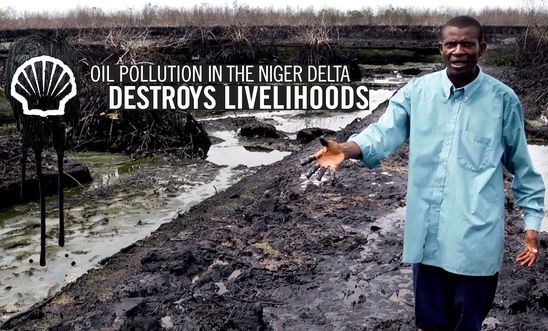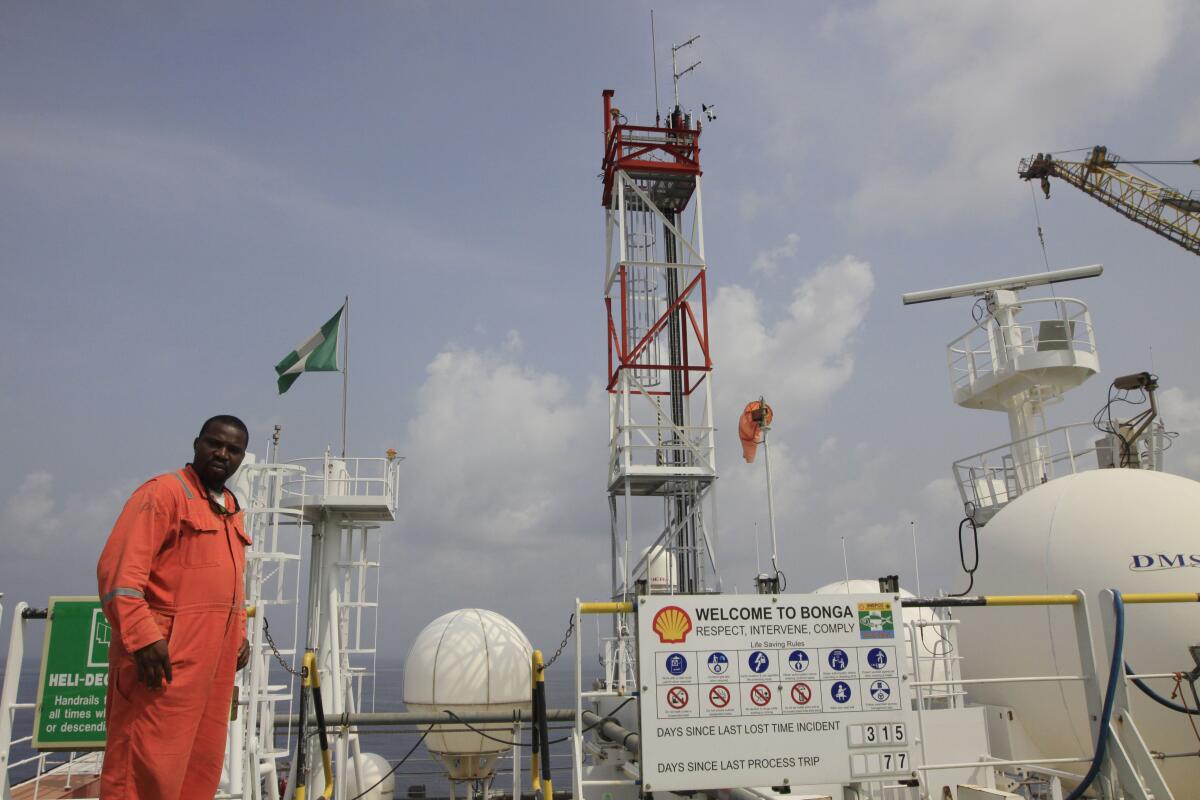
Activists call for halt to Shell's planned exit from Nigeria
Written by VOA
Advocacy
groups are calling on the Dutch oil giant Shell to halt its plans to
divest assets from Nigeria's Niger Delta region unless proper cleanup
and decommissioning of its infrastructure is complete.

Last week, a Netherlands-based nonprofit
released a report accusing Shell of trying to avoid responsibility for
oil spills. The Center for Research on Multinational Corporations'
report, entitled "Selling Out Nigeria — Shell's Irresponsible
Divestment," said the Dutch oil giant's divestment in Nigeria must be
suspended until clean-up and decommissioning of assets are complete.
The group accused Shell of trying to
avoid responsibility for decades of oil spills in Nigeria's Niger Delta
region that have polluted bodies of water and farmlands. It said Shell's
assertion that it cleaned up polluted oil spill sites is flawed and
cannot be trusted.

Faith Nwadishi, founder of Center for Transparency Advocacy, agrees with the report.
"The contract that they have signed that
talks about the issue of remediation, protection of the environment and
all of those things have not been done," said Nwadishi. "We should be
looking at the contract and interpreting it accordingly — this is
international best practice. This is what happens everywhere."
Shell operations grew controversial
Shell pioneered Nigeria's oil and gas
explorations in 1937, but its operations have been subject to
controversy and lawsuits from local communities. Shell often blamed
sabotage and vandalism by locals for busted pipelines, oil spills and
environmental pollution.
In January, the company announced plans
to sell its onshore operations to a local consortium of five companies
for $2.4 billion. Shell said the move would allow it to focus on more
lucrative offshore businesses and that it was also proof that local
companies are able to take on a larger share of Nigeria's oil and gas
industry.
But Nwadishi said if the pollution issue
is not addressed, Shell's exit could set a bad example for other
multinationals operating in Nigeria.
"Once one person sets a precedent —
especially the bad precedences — once they're set, you see other people
following up," said Nwadishi. "When they do that, what it will mean is
that they set a wrong template for other multinationals to do the same
thing. And unfortunately, we have this judicial system that takes
forever to take care of issues like that."

Law mandates funding for cleanup
Under Nigerian law, Shell is expected to
provide funding for cleanup and decommissioning of its infrastructure
before exiting. But the report says the implementation of the law is
flawed and said there is no sign that Shell is trying to comply with the
law.
The company
has not commented on the report but recently released a list of eight
cleanup operations it plans to carry out in Nigeria this year, all for
spills of less than 100 barrels of oil. Emmanuel Afimia, founder of
Enermics Consulting, said Nigerian authorities must take the Shell
divestment plan seriously.

"Nigeria should implement the following
measures: establish a robust regulatory framework that holds
multinational corporations accountable for the environmental damage
caused by their operations; ensure that affected communities are
consulted and involved in the cleanup process and that their concerns
and needs are addressed," said Afimia. "We need to monitor and evaluate
the cleanup process regularly to ensure that it is being done properly
and transparently."
VOA asked Nigeria's National Oil Spill
Detection and Response Agency for comment on the Shell issue but has not
received a response. Before Shell can sell the assets in question, it
must get approval from the Nigerian government. The government has not
said whether it will authorize the sale.






Activists urge Nigeria to delay Shell’s $2.4 billion sale of assets in deeply polluted Niger Delta
Feb. 28, 2024Local activists and international environmental groups want Nigeria’s government to delay approving the sale of oil company Shell’s onshore assets, claiming Shell is trying to shirk its environmental and social responsibilities in the highly polluted Niger Delta.
The London-based company is trying to sell its subsidiary Shell Petroleum Development Company — which operates its onshore assets in the delta — to Renaissance Africa Energy Company, a consortium of local companies. Shell says the $2.4 billion divestment deal is part of a “wider reconfiguration of the Nigerian oil and gas sector.”
But the Centre for Research on Multinational Corporations (SOMO), a Dutch non-profit, released a report Wednesday saying Shell shouldn’t be allowed to divest in the delta unless it takes “responsibility for its toxic legacy of pollution and ensures the safe decommissioning of abandoned oil infrastructure.”

Protesters have appealed to the government of Nigeria, Africa’s top oil producer, to halt the sale until environmental concerns are addressed. Lezina Mgbar, a 54-year-old healthcare worker and farmer who participated in a weekend demonstration in the country’s oil capital of Port Harcourt, said her Korokoro Tai community in Ogoniland has been “severely” affected by oil spills.
“In the morning, children and women have to travel far to get water, so children often cannot get to school on time, and our farm yields are poor,” Mgbar told The Associated Press. “We demand that Shell restore our land and clean our water before any divestment.”
Scientific studies have found high levels of chemical compounds from crude oil, as well as heavy metals, in the delta, where the industry largely drives Nigeria’s economy but can leave communities’ water sources slick with contaminants.
Activists say Shell has a history of poor divestment in the region. They point to a wellhead blowout in the Santa Barbara River, which flows through the Niger Delta, in 2021. The wellhead wasn’t producing but wasn’t decommissioned by Shell or its new owners, Aiteo Eastern E & P. The facility spewed crude oil and associated gas for 38 days and caused planet-warming methane to be released into the atmosphere, killed fish and devastated riverside farms.

Richard Steiner, an environmental consultant with a history of work in the Niger Delta, said the blowout on the Santa Barbara River highlights the risk of Shell and other oil majors transferring assets to new local firms without resolving legacy environmental and social concerns first.
“Many of the purchasing companies do not have the technical or financial capacity to manage these oil and gas operations safely,” he said.
Shell says it assesses the financial strength, culture and social and environmental performance records of companies it sells assets to. A spokesperson added that “mandatory submissions to the federal government allow the regulators to apply scrutiny across a wide range of issues and recommend approval of these divestments, provided they meet all requirements.”
Nigerian President Bola Tinubu, who holds the portfolio of petroleum minister, will ultimately decide the fate of the Shell-Renaissance transaction. His spokesperson did not comment when contacted on Monday.
SOMO’s report documents other cases of environmental pollution that were allegedly not addressed by Shell before past divestments. Two communities, Ogale and Bille in Rivers State, have been in court pushing to make the company address past environmental concerns.
Shell and other oil companies often blame third-party interference, namely militant attacks and vandalism by oil thieves, for spills. However, companies still must clean up regardless of the cause, according to Nigeria’s law.
The deal with Renaissance is the latest move by Shell to limit its onshore operations in Nigeria while focusing on deepwater operations. Other companies, including Chevron, ExxonMobil and TotalEnergies, have been taking similar steps but without the scale of protests Shell, which is the most dominant in the region, has faced.
The civil society coalition that helped organize protests aimed at delaying the sale have petitioned Tinubu to adopt a set of principles to ensure more responsible petroleum industry divestments.
That “would help ensure a transparent process that would assess the capacity of the incoming companies, with meaningful community consultation throughout, address environmental pollution and deteriorating and abandoned infrastructure,” said Florence Kayemba, director of the Niger Delta-focused Stakeholder Democracy Network, one of the groups that came up with the principles.
Unlike in previous sales, Shell is transferring all its subsidiary shares to Renaissance, resulting in a change of ownership that would see SPDC continue to carry liabilities. Shell has said SPDC, with new ownership, will continue with the current staff and be responsible for remediation where spills have occurred in the past.
SOMO’s report noted the arrangement but said the energy giant is still trying to avoid its responsibility.
Audrey Gaughran, SOMO’s director, told the AP in a statement that “ensuring that the historical pollution, the lack of funding for safe decommissioning and poor financial transparency are fully addressed in Nigeria will be an important litmus test for a just energy transition across the world.”